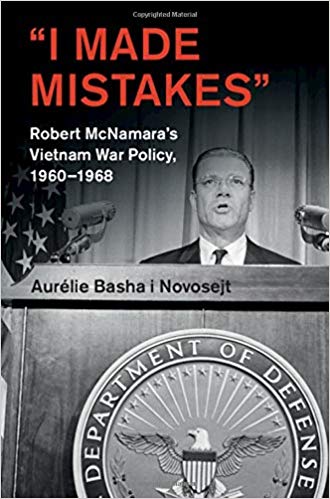Dr Aurélie Basha i Novosejt, Lecturer at The Centre for American Studies, has recently published a new book on Robert McNamara’s Vietnam War policy.
Entitled “I Made Mistakes”, the study provides a fresh and controversial examination of Secretary of Defense Robert S. McNamara’s decisions during the Vietnam War. Although McNamara is remembered as the architect of the Vietnam War, Novosejt draws on new sources – including the diaries of his advisor and confidant John T. McNaughton – to reveal a man who resisted the war more than most.
Speaking to an advisor in 1966 about America’s escalation of forces in Vietnam, Secretary of Defense Robert S. McNamara confessed: ‘We’ve made mistakes in Vietnam … I’ve made mistakes. But the mistakes I made are not the ones they say I made’. As Secretary of Defense, he did not want the costs of the war associated with a new international commitment in Vietnam, but he sacrificed these misgivings to instead become the public face of the war out of a sense of loyalty to the President.
“I Made Mistakes”; Robert McNamara’s Vietnam War Policy, 1960–1968 is published by Cambridge University Press
Reviews of the book
‘Basha’s careful account of McNamara’s Vietnam policies is a terrible indictment not just of the policies but of McNamara’s moral failure in prizing loyalty over lives. How he defined his job dictated his failures. Recommended reading for all future defense secretaries.’
Kori Schake – Deputy Director-General, The International Institute for Strategic Studies
‘I didn’t think there could be much more to say about Robert McNamara and the escalation of America’s war in Vietnam, but Aurélie Basha i Novosejt has proven otherwise. In this boldly original book, she forces us to revisit basic assumptions about an important but enigmatic figure. By showing that economic concerns were paramount, by considering counterinsurgency from a different angle, and by emphasizing previously neglected institutional changes within the Pentagon, Basha is able to shed new light on the subject. But even more, by revealing that McNamara opposed the war at its very beginning, even as he was planning its expansion, Basha is able to reveal the ultimate price of loyalty.’
Andrew Preston – University of Cambridge

